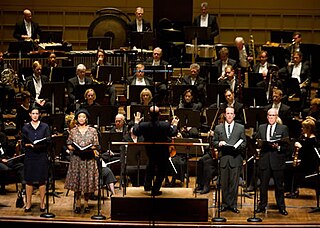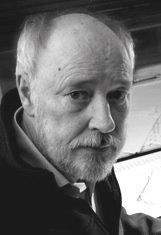Related Research Articles

The Pulitzer Prize for Music is one of seven Pulitzer Prizes awarded annually in Letters, Drama, and Music. It was first given in 1943. Joseph Pulitzer arranged for a music scholarship to be awarded each year, and this was eventually converted into a prize: "For a distinguished musical composition of significant dimension by an American that has had its first performance in the United States during the year."
Although a concerto is usually a piece of music for one or more solo instruments accompanied by a full orchestra, several composers have written works with the apparently contradictory title Concerto for Orchestra. This title is usually chosen to emphasise soloistic and virtuosic treatment of various individual instruments or sections in the orchestra, with emphasis on instruments changing during the piece. It differs from sinfonia concertante in that it has no soloist or group of soloists that remains the same throughout the composition.

Esa-Pekka Salonen is a Finnish conductor and composer. He is the music director of the San Francisco Symphony and conductor laureate of the Los Angeles Philharmonic, Philharmonia Orchestra in London and the Swedish Radio Symphony Orchestra. In 2024, he announced his resignation from the San Francisco Symphony upon the expiration of his contract in 2025.
David Walter Del Tredici was an American composer. He won a Pulitzer Prize for Music and was a Guggenheim and Woodrow Wilson fellow. Del Tredici is considered a pioneer of the Neo-Romantic movement. He was also described by the Los Angeles Times as "one of our most flamboyant outsider composers".

Steven Edward Stucky was a Pulitzer Prize-winning American composer.
Pines of Rome, P 141, is a tone poem in four movements for orchestra completed in 1924 by the Italian composer Ottorino Respighi. It's the second of his three tone poems about Rome, following Fontane di Roma (1916) and preceding Feste Romane (1928). Each movement depicts a setting in the city with pine trees, specifically those in the Villa Borghese gardens, near a catacomb, on the Janiculum Hill, and along the Appian Way. The premiere was held at the Teatro Augusteo in Rome on 14 December 1924, with Bernardino Molinari conducting the Augusteo Orchestra, and the piece was published by Casa Ricordi in 1925.
Hila Plitmann is an Israeli-American two-time Grammy Award-winning operatic soprano, songwriter, and actress specializing in the performance of new works.
Bernard Rands is a British-American contemporary classical composer. He studied music and English literature at the University of Wales, Bangor, and composition with Pierre Boulez and Bruno Maderna in Darmstadt, Germany, and with Luigi Dallapiccola and Luciano Berio in Milan, Italy. He held residencies at Princeton University, the University of Illinois, and the University of York before emigrating to the United States in 1975; he became a U.S. citizen in 1983. In 1984, Rands's Canti del Sole, premiered by Paul Sperry, Zubin Mehta, and the New York Philharmonic, won the Pulitzer Prize for Music. He has since taught at the University of California, San Diego, the Juilliard School, Yale University, and Boston University. From 1988 to 2005 he taught at Harvard University, where he is Walter Bigelow Rosen Professor of Music Emeritus.

Kanon Pokajanen is a 1997 composition by Arvo Pärt for four-part (SATB) choir. The text is the "Canon of Repentance to Our Lord Jesus Christ", an Orthodox hymn. The text is sung in Church Slavonic and following the tradition of Russian sacred choral music, it is sung a cappella.

Spring Symphony is a choral symphony by Benjamin Britten, his Opus 44. The work is scored for soprano, alto and tenor soloists, mixed choir, boys' choir and orchestra. Britten used texts of several poems related to spring, mostly from the 16th and 17th centuries and also one by W. H. Auden. Britten dedicated the work to Serge Koussevitzky and the Boston Symphony Orchestra. The work received its premiere in the Concertgebouw, Amsterdam on 14 July 1949 as part of the Holland Festival
Christopher Chapman Rouse III was an American composer. Though he wrote for various ensembles, Rouse is primarily known for his orchestral compositions, including a Requiem, a dozen concertos, and six symphonies. His work received numerous accolades, including the Kennedy Center Friedheim Award, the Grammy Award for Best Classical Contemporary Composition, and the Pulitzer Prize for Music. He also served as the composer-in-residence for the New York Philharmonic from 2012 to 2015.

Anders Erik Birger Eliasson was a Swedish composer.

The Pulitzer Prize is awarded to the best in journalism and the arts for pieces of exceptional quality. In 1984, the recipients were:

In the Dawn is a song written by the English composer Edward Elgar in 1901 as his Op.41, No.1.
The Trombone Concerto is a concerto for trombone and orchestra by the American composer Christopher Rouse. The work was commissioned by the New York Philharmonic for its principal trombonist Joseph Alessi. It was completed on April 5, 1991, and was first performed by Alessi and the New York Philharmonic conducted by Leonard Slatkin on December 30, 1992, in Avery Fisher Hall, New York City. The concerto is dedicated to the composer and conductor Leonard Bernstein, who died suddenly October 14, 1990. In 1993, the work was awarded the Pulitzer Prize for Music.

"Ständchen" ("Serenade") is an art song composed by Richard Strauss in 1886, setting a poem of the same title by the German poet Adolf Friedrich von Schack. It is the second of his Six songs for high voice and piano, Op. 17, TrV 149, all set to Schack poems.

Die Tageszeiten is a choral composition written for male voice choir and orchestra by Richard Strauss (1864–1949), TrV 256, Op. 76. It consists of four movements: "The Morning", "Afternoon Peace", "The Evening" and "The Night". The lyrics are based on four poems of the same names by Joseph Eichendorff (1788–1857) from his collection Wanderlieder. The work was premiered on 21 July 1928 with the Wiener Schubertbund and the Vienna Philharmonic as part of the Schubert centenary.
One Sweet Morning is a four-movement song cycle for mezzo-soprano solo and orchestra by the American composer John Corigliano. The work was jointly commissioned by the New York Philharmonic and the Shanghai Symphony Orchestra to commemorate the 10th anniversary of the September 11 attacks. It was given its world premiere on September 30, 2011, by the mezzo-soprano Stephanie Blythe and the New York Philharmonic under the conductor Alan Gilbert. The piece is dedicated to the memory of Natalie and Serge Koussevitzky.
Giuseppe "Pippo" Rinaldi, known by his stage name Kaballà, is an Italian musician and singer-songwriter.
The Symphony No. 3 is a symphony for orchestra by the American composer Ellen Taaffe Zwilich. The work was commissioned by the New York Philharmonic to commemorate their sesquicentennial anniversary. It was first performed by the New York Philharmonic conducted by Jahja Ling on February 25, 1993. The symphony is dedicated "with love and admiration" to Kurt Masur and the New York Philharmonic.
References
- ↑ Randolph, Eleanor (April 17, 1984). "1984 Pulitzer Prizes Stress In-Depth Reporting On Social Issues". The Washington Post . Retrieved August 25, 2020.
- ↑ Mellor, Andrew (June 2019). "RANDS Piano Conerto (Jonathan Biss)". Gramophone . Retrieved August 25, 2020.